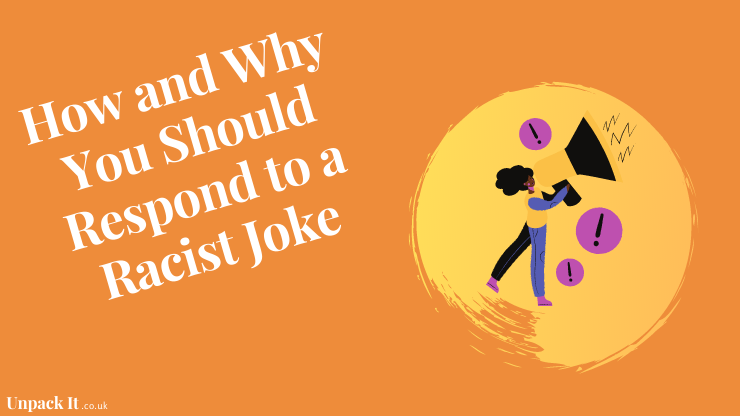Ever been in a situation where someone tells a racist joke? Did you find it inappropriate yet kept quiet because you didn’t know how to address it? Did you instead shake your head and walk away? We’ve probably all experienced this in one way shape or form. So this article will unpack why these jokes are more than offensive and address how to handle them if you’re confronted with one.
Racist jokes are not only offensive, they are oppressive. By telling one, however harmless you may think it is, you’re almost certainly going to hurt the feelings of marginalised groups. Whether intended or not, it will also reinforce negative stereotypes and ideas about them.
How?
For marginalised groups that have a long history of oppression, such as; women, LGBTQ+, people of colour and ethnic minorities, they have come a long way from having little to no human rights. However there is still a long way to go to reach equality. So if a negative joke is made about these groups, it can release inhibitions and justify some people’s discriminatory beliefs. Particularly if the joke is made by someone influential.

We now live in an era where overt racism is widely unacceptable and can ruin people’s brands and end their career. We’ve seen Wiley get cancelled as a result of his anti-Semitic comments on social media. Yet all that’s happened to Katie Hopkins is getting permanently removed from Twitter. But that’s a whole other story to unpack…
However, casual racism is still very common and often not as easy to identify or address. Usually because people are ignorant to the harm their words or actions have and the offence that can be taken. Racist jokes are a form of casual racism and we often don’t know how to handle them when we’re confronted with one.
Speak Up
Words can be powerful, even when used in a joke. If we don’t call someone out on a racist joke, we are essentially signalling that what they said was ok, because if it wasn’t, someone would have surely spoken up. Even though it’s easier to stay silent to avoid confrontation, by doing so the person remains ignorant and will repeat the joke to someone else. So tell them what they said was distasteful and oppressive. Tell them their joke diminishes people of colour as well as diminishes their own image.
Suggestions
Before calling someone out, it’s worth considering what kind of person you are dealing with and how they will react to you. Are they:
- the defensive type: “What are you trying to say?!”
- the dismissive type: “You’re overreacting, it’s just a joke”
- self-aware: open to constructive feedback and don’t take things personally
It’s worth tailoring what you say and how you say it depending on how they react in order for it to have an effect on them. If in doubt, bring them to the side and start off with asking what they meant by the joke and if they knew what they said was offensive. Then proceed to tell them why.
It can be really tiring for people of colour to hear distasteful racist jokes, let alone having to handle them. They should not have the sole responsibility to call people out. It’s not their job to educate people on racism. It’s just as much white people’s responsibility, if not more, to call out casual racism and to show their allyship with people of colour.
Check out this CNN anti-racist allies article for tip on more tips on how to respond to racism and microaggressions.
Share article
If you liked this article…



